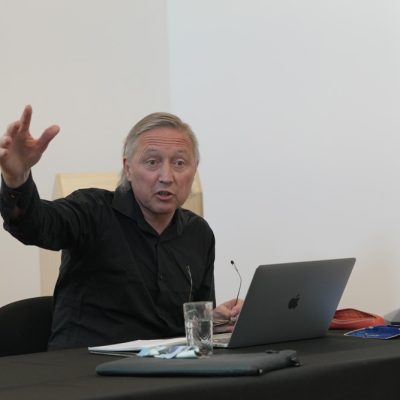
Building upon the workshop, What is the University for? (Cape Town, 2024), this partnership focuses on a far-reaching problem: how can we rethink, reimagine, and redefine the role of the university in globalised societies confronted with multiple forms of disruption? What does the university mean and what is its purpose in the Disruptive Condition? Under the working title Re:Timing the University. Apartitionality and the University-to-Come, LIAS and CHR are developing a new conceptualization of the university. Together, we are building on the work of re-describing our situation, which has been taking place at Leuphana for several years under the title of the Disruptive Condition.
A detailed discussion between Erich Hörl and Premesh Lalu titled “Unseating Mastery: The University and the Promise of the New” has just been published in the journal Theory, Culture & Society. It provides an insight into the topics and discourses of the cooperation on the upcoming university.
In the future, the project will also aim to promote and exchange doctoral and postdoctoral researchers, which will result in an academic profile of interdisciplinary perspectives and global issues related to the problem complex of the university to come.
“The collaboration enables an unprecedented redefinition of the university’s task while fostering critical dialogue between local and global perspectives,” explains Prof. Dr. Erich Hörl, who has been Professor of Media Culture and Media Philosophy at Leuphana University Lüneburg since 2014.
LIAS
The Leuphana Institute for Advanced Studies (LIAS) at Leuphana University of Lüneburg is a research institute that contributes to the development and internationalisation of the university’s main research priorities. Driven by an international fellowship program, it meets the challenges of a globalised present in a research-based way. It is committed to countering a discourse of no alternatives. Over and above short-term solutions for overcoming crises, it strives to open new perspectives, spaces for thought and action. Accordingly, it promotes engaged scholarship to uncover, support and multiply modes of societal potentialization – a questioning of existing certainties that activates and engenders new possibilities.
For more information:
What is the University for? (Cape Town, 2024)
